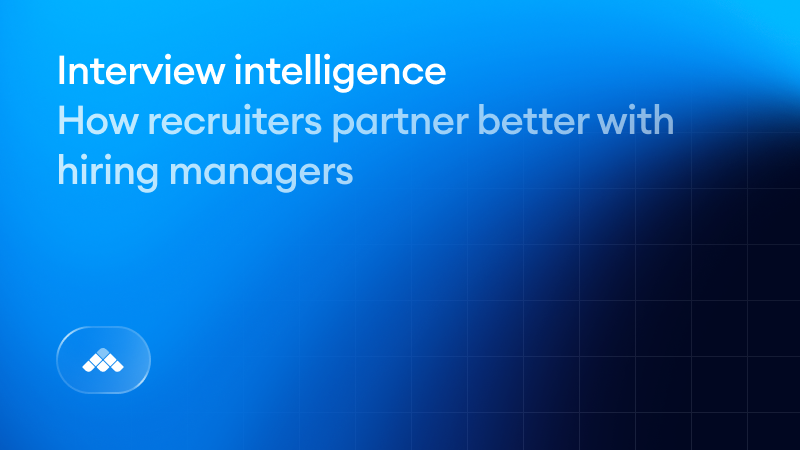Although one of the most crucial parts of the hiring process, interviews are typically a black box. Hiring teams can align on skills to test and questions to ask, but there’s little insight into what actually goes on when interviewers and candidates get into a room together. And debriefs and scorecards can only reveal so much.
All of this poses challenges for hiring managers trying to make informed, fair decisions about who should join their team.
Interview intelligence is the best way to break through this opaque process. With the ability to record, transcribe, and analyze interviews, hiring managers can gain deeper insight into these signal-rich conversations. And you can use data to make sure an interview process is consistent, fair, fast, and high quality.
But hiring managers aren’t the only ones who can benefit from pulling back the curtain on later rounds of the interview process. There’s also immense value that can be unlocked by recruiters, too.
Key takeaways
What is interview intelligence?
Interview intelligence is the practice of capturing, analyzing, and leveraging insights from candidate interviews to improve hiring decisions. Instead of relying on scattered notes or subjective impressions, interview intelligence offers you structured, evidence-based data about what happened in interviews.
By making interviews more transparent and measurable, interview intelligence helps recruiters become stronger strategic partners to hiring managers. It ensures everyone is aligned on what was said, how candidates performed, and how decisions are made—leading to more consistent, fair, and efficient hiring.
What does interview intelligence involve?
At its core, interview intelligence is about turning conversations into actionable data. This typically includes:
- Recording interviews so no detail is lost and everyone has access to the same source of truth.
- Transcribing conversations into accurate, searchable text that removes the need for frantic note-taking.
- Distilling insights by summarizing key themes, aligning feedback to hiring rubrics, and flagging moments that demonstrate critical skills or behaviors.
Together, these steps ensure interview evidence is captured consistently and turned into data that recruiters and hiring managers can actually use. With interview intelligence in place, teams move beyond gut feel, reduce bias, and collaborate more effectively to identify the best candidates.
Key hiring benefits of interview intelligence
Though a recruiter’s role in actually interviewing a candidate typically ends after initial screening calls, they continue to be a candidate’s main point-of-contact with your organization and a guide throughout the end-to-end experience.
Each candidate who passes through the process for a particular role (successfully or not) is an opportunity for recruiters to gain more data points about what hiring managers are looking for in a successful candidate.
1. More efficient and precise calibration
When given a window into later-stage interviews, recruiters can reference real-world interactions between interviewers and candidates to calibrate on what good looks like much more quickly. Knowing what key qualities and skills actually look like in practice, recruiters can use this insight to improve early-stage screening and avoid frustrating disqualification of candidates late in the game.
Júlia Esteban Edo, Recruiting Lead at Metaview, says that access to recordings of interviews can be a game-changer for technical interviews:
“When you review a recording of a technical interview, you can see where it may become apparent that a candidate lacks necessary problem-solving abilities. It’s easy for a recruiter to then translate that into screening questions that test for the same skill earlier on.”
The same principle applies to non-technical testing, too. It allows recruiters to better grasp how hiring managers define amorphous concepts like “drive” and “impact". For example, in values interviews Júlia takes note of the questions interviewers ask that often reveal information that ultimately influences hiring decisions. She then makes sure to implement these as screening questions earlier in the process.
Bob Snellenburg, Senior Tech Recruiter at Catawiki, also uses Metaview to better analyze the nuances of how interviewers approach the role they’re hiring for. He says, “Metaview helps me to understand a role as the interviewer sees it: How do they talk about the role? How do they sell it? What types of questions do they ask?”
This insight allows him to see how a role is evaluated in practice and where there might be room for constructive feedback.
2. Reduced bias
Bias in interviews often comes from memory lapses or gut feel—interviewers may unconsciously give more weight to a candidate who reminds them of themselves, or dismiss someone based on communication style rather than substance.
Interview intelligence minimizes this by capturing a full, objective record of every interview and aligning notetaking with predefined rubrics. That means hiring teams make decisions based on evidence, not hunches.
For example, a tech company using interview intelligence discovered that some interviewers consistently scored candidates lower on communication, even for technical roles where it wasn’t a core competency. With transcripts and rubric-based evaluations in place, they were able to recalibrate and reduce that bias, resulting in a more diverse set of hires.
3. Identify areas for process improvement
By enabling a big-picture view of how a hiring process is unfolding, Interview Intelligence can also help recruiters uncover inconsistencies and opportunities for process-level improvements. For example, after reviewing interviews captured by Metaview, Bob identified that there was an opportunity to optimize the level of “fact-based” hiring amongst interviewers at Catawiki to ensure that feedback was rooted in empirical evidence rather than gut-feel.
As a result, the recruitment team worked with hiring managers to develop a scorecard system that empowered teams to consistently evaluate candidates against a set of defined attributes. Without Interview Intelligence, this level of insight could only have been gleaned by physically attending interviews, which is not only time-consuming but also has the potential to degrade the candidate experience.
4. More authentic candidate relationships
A less obvious benefit of interview intelligence is improved helpfulness and authenticity of the recruiter-candidate relationship. For example, it can facilitate higher-quality candidate prep.
Júlia says, “If you can watch recordings of interviews, you can prep candidates much better, which is key to what leads to success at the end of the day. It’s very different if you’re repeating what someone else told you is going to happen in an interview versus seeing what actually happens for yourself.”
And when it comes time to relay hiring decisions, visibility into advanced stages of the process can equip recruiters with the necessary context to give candidates honest and genuine feedback about what led to a particular decision. Overall, recruiters’ increased understanding of what’s going on throughout the interview process can authentically preserve the essential human element of hiring.
5. Faster feedback loops
One of the most common bottlenecks in hiring is waiting for interviewers to submit their notes. Without structured support, feedback can be delayed for days, stalling the process and frustrating candidates.
Interview intelligence solves this by automatically generating summaries and tagging key moments, so interviewers and recruiters have usable notes immediately after the conversation.
This also cuts your prep time for wash up meetings in half—what used to take several days now happens within hours. Faster feedback loops not only speed up hiring but also improve the candidate experience by keeping communication timely and professional.
How Metaview delivers interview intelligence
Metaview delivers interview intelligence that recruiters and hiring managers can actually act on. Instead of relying on scattered notes or subjective recollections, Metaview automatically captures, transcribes, and summarizes interviews in real time.
The result is structured, evidence-based feedback tied directly to your hiring rubrics. So every evaluation is consistent and comparable.
How we do this:
- AI-generated interview notes that capture key moments without manual effort.
- Structured scorecards that align feedback directly to hiring rubrics.
- Centralized insights that reveal patterns across interviews, such as bottlenecks or bias.
- Instant feedback summaries that eliminate the need to chase interviewers for notes.
- Scalable reporting that makes it easy to share trends with stakeholders and hiring managers.
Companies like Cockroach Labs have saved 14+ work weeks with Metaview, while Deel has scaled global hiring without losing speed or consistency.
Together, these results show the impact of interview intelligence when it’s embedded into every step of the hiring process.
Want to see it for yourself? Try Metaview for free.
Interview Intelligence drives value for the entire hiring team
Interview intelligence is particularly powerful in late-stage interviews, where you assess candidates’ technical chops or how they demonstrated impact in previous roles. This is where critical insights emerge on candidate and interview quality, and where technology can most effectively complement the human aspect of hiring.
And while this deep visibility into later-stage interviews is perfect for interviewers and hiring managers, don’t overlook the strategic benefit it brings recruiters, too.
Recruiters can leverage insights to inform up-front screening that quickly identifies candidates with the best chance of success and also enables a birds-eye view that can uncover opportunities for step-change process improvements.
The result? Increased efficiency, happier candidates, and more high-quality hires.


